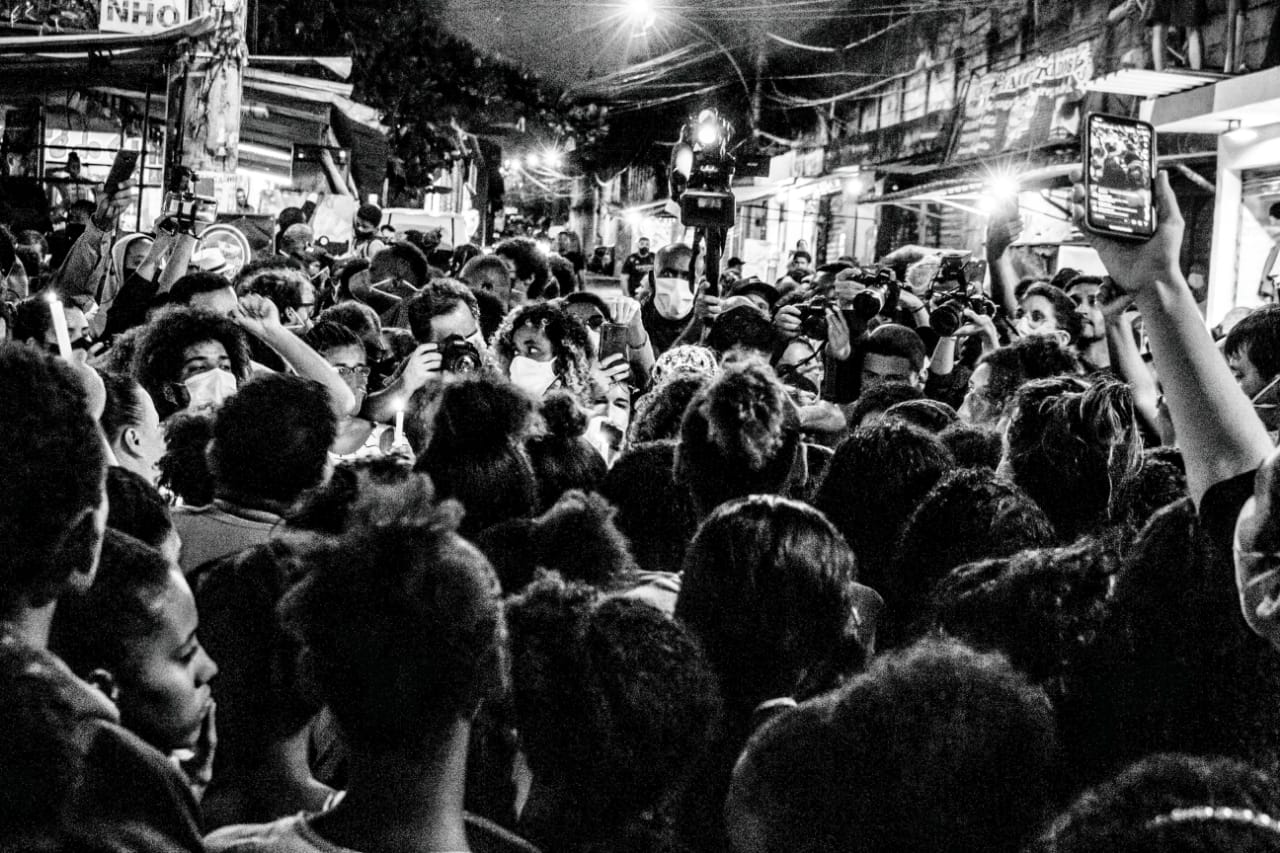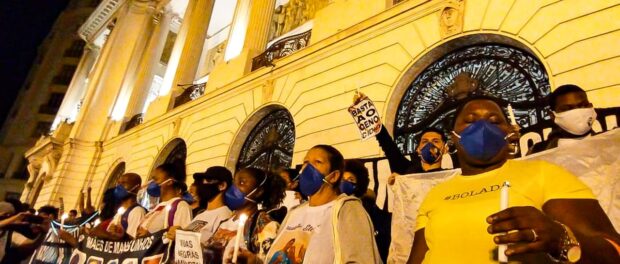
Black Coalition for Rights organizes the “May 13 of Struggles” protest against black genocide and demands justice for the Jacarezinho massacre.
Neither the rain or cold, nor the pandemic, kept people from taking the streets of Rio de Janeiro and of 40 other Brazilian cities on Wednesday, May 13 to protest racism and the genocide of black Brazilians.
The protest, organized by the Black Coalition for Rights—a national alliance made up of over 200 organizations, initiatives, groups and collectives from the Brazilian Black Movement—took demonstrators to the streets wearing face masks and guided by the motto: “Not from Gunshots, Covid or Hunger! Black People Want to Live!” underlining the complaint contained in the Coalition’s manifesto: “We denounce to the world that we live in a country where we may be dead tomorrow because we are black.”
In all, there were 41 demonstrations in Brazil and three abroad, with one in London and two in the United States, in the cities of New York and Austin. The name “May 13 of Struggles” alludes to the end of slavery in Brazil which took place on May 13, 1888.
Among the movement’s revindications are the guarantee of an emergency aid payment of R$600 (US$113) until the end of the pandemic; the black population’s right to the coronavirus vaccine and to be properly assisted by the Brazilian Unified Health System (SUS); and in favor of Jair Bolsonaro stepping down from the presidency.
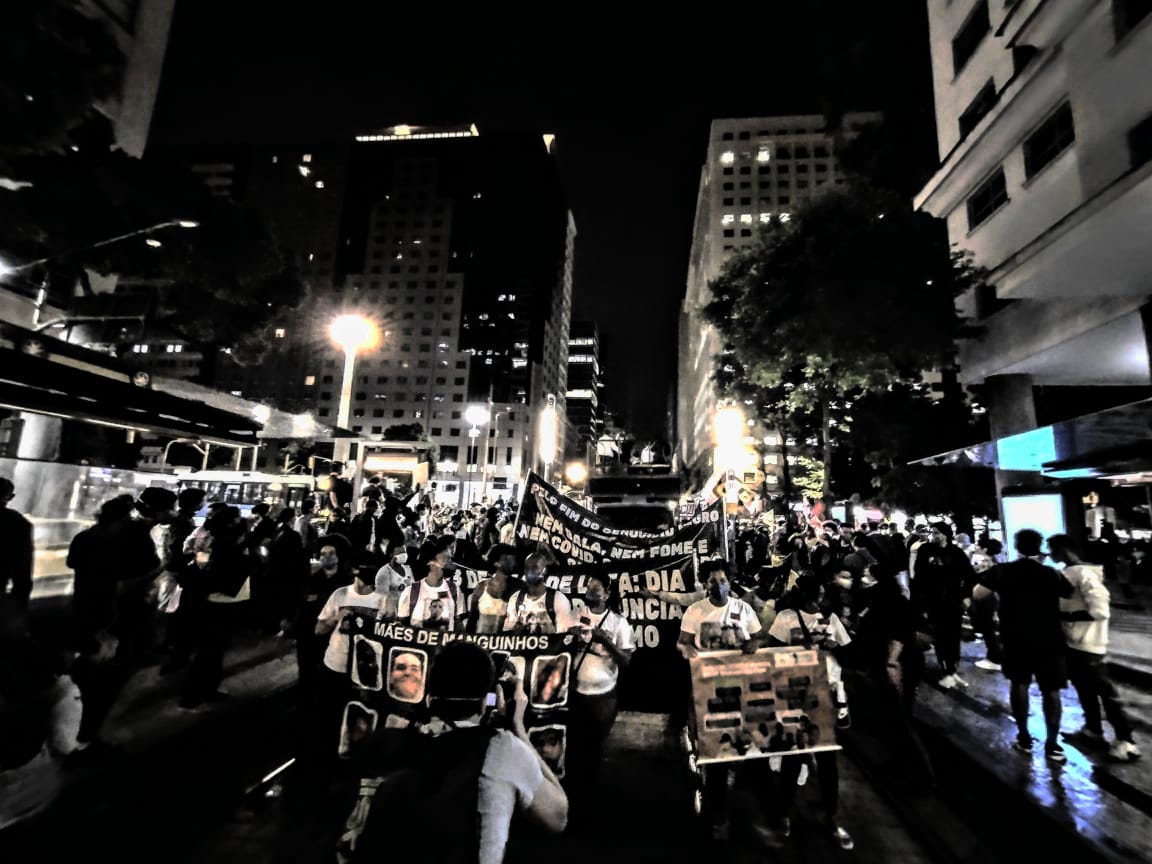
The protest, also called #May13IntheStreets, was a reaction to the atrocities committed during the police raid which resulted in this month’s #Jacarezinho Massacre, the most lethal in the history of the city of Rio, and which culminated in 29 deaths: 28 civilians and one police officer.
“Our children have been spinelessly murdered in the favelas. They are chased, arrested, shot in the back, and killed while unarmed, like my son Johnatha, killed by a police officer from the UPP (Pacifying Police Unit). It’ll be seven years tomorrow [May 14]. This proves there was no abolition. What is this freedom we have, that kills us? This abolition is fake! And it’s not just the police! The entire legal system has the deaths of our children on the tip of their pens. But our dead have a voice. Our children have mothers,” roared Ana Paula de Oliveira, from the collective Mothers from Manguinhos, a movement that brings together mothers of victims of violence perpetrated by the State of Rio de Janeiro.
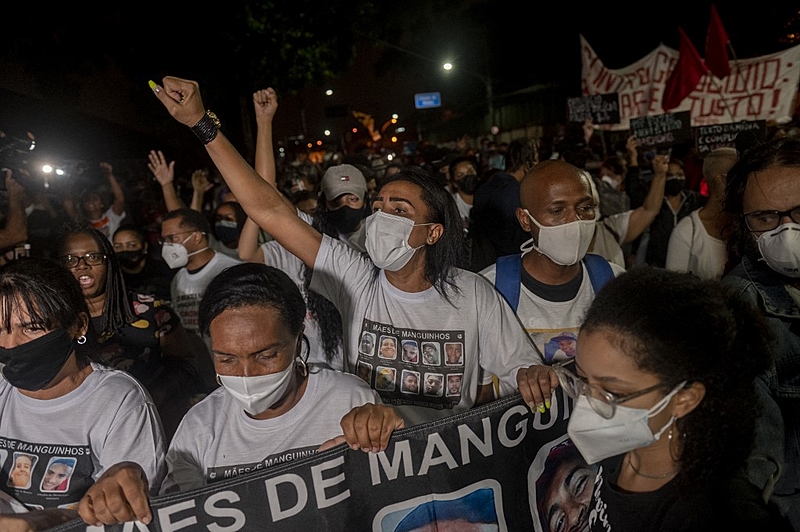
In Brazil, every 23 minutes, a young black man is murdered. The victims of police violence in Rio de Janeiro are overwhelmingly black. Of the 885 civilians killed by police in Rio in the first half of 2019, 80% were black or brown. 133 years after the abolition of slavery, the black population is still the target of police violence and experiences the effects of structural racism.
A #ChacinanoJacarezinho trouxe o fim de 28 pessoas e todos merecem serem lembrados, todos!! Pois todos são seres humanos e eles tem nome e sobrenome!! @coalizaonegra #13deMaioNasRuas pic.twitter.com/okg0CLzK9F
— Monica Cunha (@monicacunhario) May 14, 2021
The #JacarezinhoMassacre ended the lives of 28 people and every one of them deserves to be remembered: every one! For they are all human beings; they all have a first and a last name! @coalizaonegra #13deMaioNasRuas
Besides being the date of the abolition of slavery, May 13 is also the Brazilian National Day for Denouncing Racism. For the Black Movement, taking into account the socioeconomic consequences of lack of assistance to the people who were freed—which are felt to this day—May 13 is a day of struggle, not of celebration. Brazil was the last Western country to free enslaved peoples and to ban slavery.
#May13InThe Streets
“I am a black woman, a member of Jacarezinho’s Data and Narratives Laboratory (LabJaca). I was born and raised in the City of God and I’m 21. I’m tired of coming to the streets to talk about death. I want to talk about life, but they won’t let me. Black youth from favelas can’t stand it anymore. We want to talk about power, about life stories, but the State won’t let us,” protested law student Mariana Galdino.
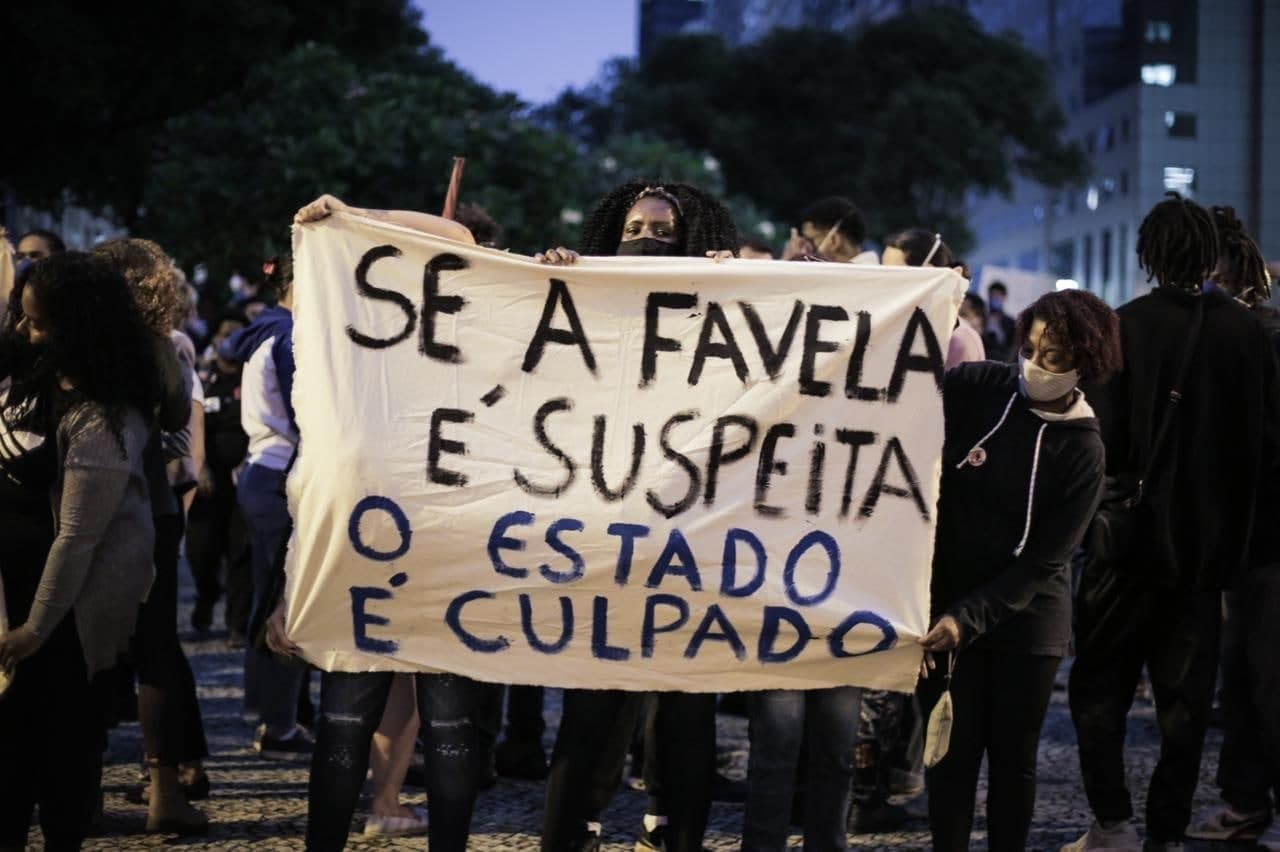
Throughout the day, seven protests took place in Rio de Janeiro, the main one in Candelária, Central Rio. At 6pm, protestors walked to the main square in Cinelândia, occupying the stairs of the City Council. MC Galo, a resident of Rocinha, sang the song “Eu só quero é ser feliz, andar tranquilamente na favela em que nasci,” [All I want is to be happy, and walk peacefully in the favela where I was born], which has become an anthem in the favelas. From atop a sound truck, he also rallied protestors to the carioca funk beat.
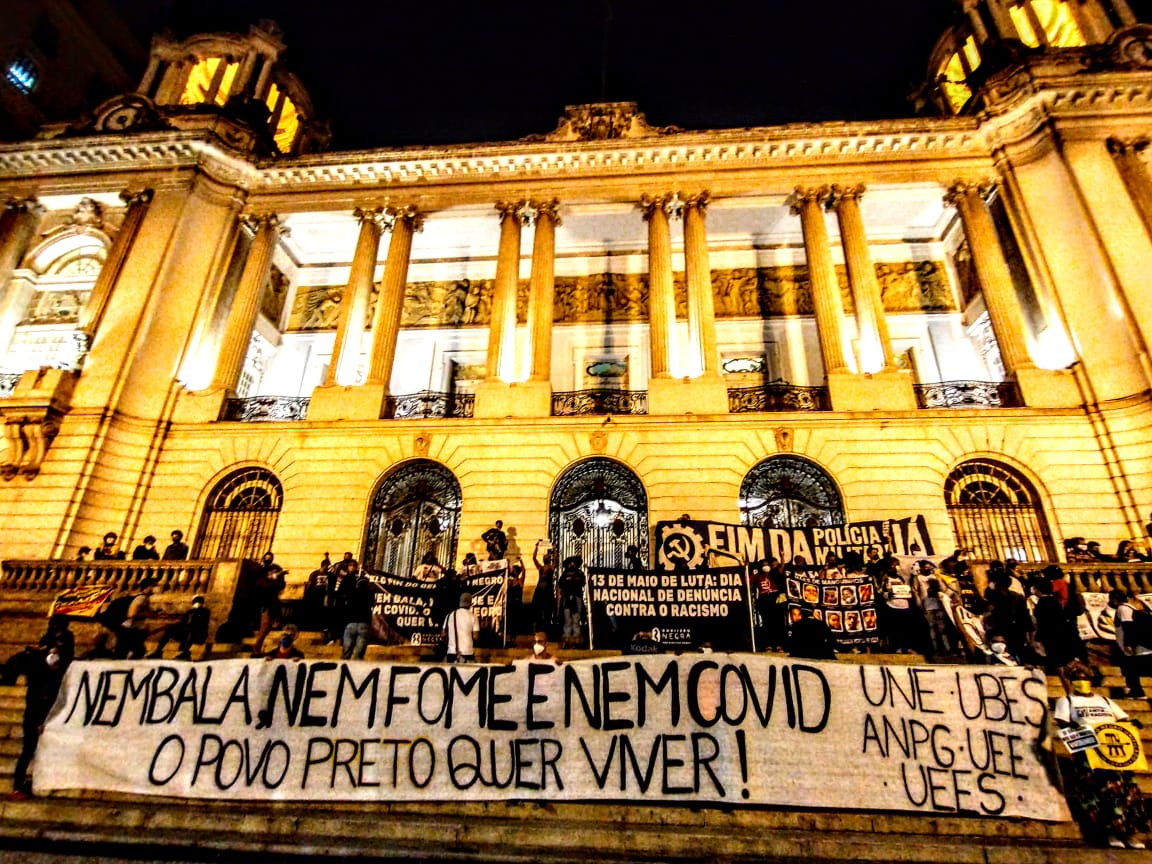
“The genocide of the black body continues to be deemed ‘natural.’ For this reason, on this May 13, we have taken the streets to denounce the false abolition, since it never [truly] took place in this country. We demand an immediate investigation of the Jacarezinho massacre. 28 dead cannot be called a police operation, it’s a massacre! I wonder if what happens in the favelas of the North and West Zones of Rio would happen during a police operation in Barra da Tijuca? In the South Zone? What lives matter? We need an independent control of the police,” questioned Seimour Souza, coordinator of Uneafro-RJ and a member of the Black Coalition.
Although Rio de Janeiro and São Paulo—the main protest there occupying Avenida Paulista—concentrated 15 demonstrations, from north to south of the country people decried the genocide of the black population and demanded justice for the victims of the Jacarezinho massacre. The protests brought together historical Black Movement agencies and organizations—such as the Unified Black Movement—and current ones, such as members of the Black Coalition of Rights.
“The police’s bullet is selective,
the judge’s sentence is selective,
the banks’ revolving doors are selective,
the mall’s security guard is selective,
the security guards at Extra and Carrefour supermarkets are selective,
our death continues to be institutionalized by the Brazilian State,
the police are racist: step down, genocidist” — Manifesto repeated in all 41 protests spread across Brazil
Rivers of Fears
“We’ve taken the streets because we’ve once again had to leave our homes… We were here last year when they killed João… They forced us out of our houses because they were going into our homes to kill us! And once again, a year later, they’re killing us. They don’t stop killing us! We’ve taken the streets because life is not a favor. Life is a right,” protested Wesley Teixeira, PerifaConnection columnist.
Less than a year ago, on May 31, various black collectives marched during the pandemic to protest against the lives of black and favela youth killed by the police, screaming, “Black Lives Matter” and “Favelas Lives Matter,” both in Portuguese and English, demanding the end of violent police raids in favelas. This was partly inspired by demonstrations reacting to the death of George Floyd.
These protests happened mainly following a series of murders perpetrated by police officers against young black men during operations in Rio’s favelas. Among them, João Pedro Mattos Pinto, 14, inside his home in Complexo do Salgueiro, São Gonçalo, on May 18, 2020.
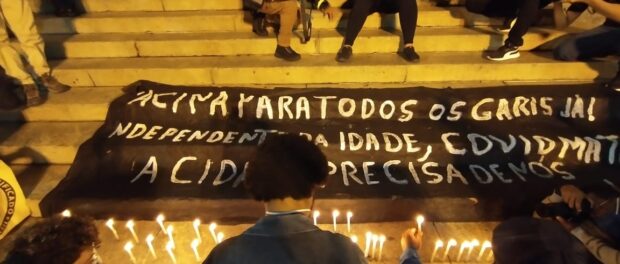
The Jacarezinho massacre inserts itself on the very top of the list of killings that scar the everyday life of Rio de Janeiro’s favelas, exposing Brazilian racism. In the view of the protesters, “when the State is more dangerous than the virus,” taking the streets is not a choice, but the struggle for survival. “We are watching a genocide of the black population, with the lack of vaccines, no emergency aid payments, hunger and police raids in the middle of the pandemic! Enough!” they shouted during the #May13intheStreets march.
Meanwhile, across the city, near the Complexo do Alemão, a stray bullet hit the top window of a bus while it crossed the Estrada do Itararé. No one was hurt inside the bus but, in Morro do Adeus, a person was wounded during the shootout. Once again, residents washed away blood from the ground in the favela, as decried by Tuany Nascimento, instructor and creator of the project On your toes. Her post was retweeted in English:
This is a ten minute walk from where I Iived in Rio.
Another police operation. More blood in the streets of the favelas.
Follow Tuany 👇🏻👇🏻👇🏻 She is the founder of a brilliant ballet project in Morro do Adeus (part of Complexo do Alemão, in Rio de Janeiro). https://t.co/vXkJ5PsxQa
— Edmund Ruge (@EdmundRuge) May 13, 2021
Original Tweet by Tuany Nascimento: “On May 13, 1888, “slavery was abolished”
Today, May 13 2021, here are some glimpses of what our “FREEDOM” is
“This Is Not An Isolated Case”
Tatiane Mendes, a journalist and photographer who lives on the outskirts of Rio, took the streets equipped with her camera, a FFP2 face mask and hand sanitizer to protest the black genocide. As impacted as she was by the newscasts of May 6, the day when 28 residents of Jacarezinho were executed by the civil police, there was no other place to be. She took part in the protest called by residents and residents’ associations the day right after the massacre, May 7, inside the Jacarezinho favela, in the North Zone. In Tatiane’s words:
“There was an urgent need to organize ourselves, to give a response to ourselves and to the State in the face of a grief that belongs to so many, and to all of us. Grief that goes beyond revulsion, beyond the fear of more raids, and that led us to march in front of Cidade da Polícia [civil police complex in Rio’s North Zone that houses 15 special departments including the CORE, which conducted the raid], the same place from which the murderers of Jonathan, Jonas, Márcio, Carlos, Rômulo, Francisco, Cleyton, Natan, Maurício, Ray, Guilherme, Pedro, Luiz, Isaac, Richard, Omar, Marlon, Bruno, Pablo, John, Wagner, Matheus, Rodrigo, Toni, Diogo, Caio and Evandro left from.
From there, we took our route to the public square in Jacarezinho, site of the protest. As the rain fell on that Friday, May 7, with nonstop news stories running in the background, announcing yet another victim of the massacre with every hour; on top of the growth in cases of Covid-19; on top of the uncertainties of when vaccines will be available to everyone; and on top of the increasing numbers of families facing food insecurity. In a scenario like this, the notion of a massacre—disobeying the court’s decision to ban police operations during the pandemic—makes us understand that the police operations of the state of Rio de Janeiro inside favelas are no mistake, they are an extermination project; and they highlight the certainty of how urgent it is to organize ourselves in order to face this atrocity.
Unfortunately, the Jacarezinho massacre is not an isolated event but, I shall repeat, the systematic reproduction of a management model that kills all bodies it finds in its way—from hunger, a gunshot or negligence. At this time, taking the streets means joining forces with all those who defend human rights, and on behalf of all of those who cannot be here. And also, to strengthen the historical commitment to take a stand, to listen and to face this savagery, because it is already too late.”
